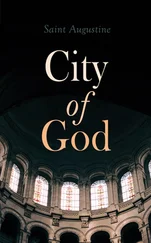Num. xvi.
Non convicti sed conficti traditores.
Rom. xiv. 4.
Ps. lviii. 1; though slightly varied from the LXX.: si vere justitiam diligitis; for ει αληθως αρα δικαιοσυνην λαλειτε
John vii. 24.
Matt. vii. 15.
1 Cor. xiv. 29, 30.
Cypr. Ep. lxxi.
The former Council of Carthage was held by Agrippinus early in the third century, the ordinary date given being 215 A.D.
Tanquam lectulo auctoritatis.
Cypr. Ep. lxxi.
The general Council, on whose authority Augustine relies in many places in this work, was either that of Arles, in 314 A.D., or of Nicæa, in 325 A.D., both of them being before his birth, in 354 A.D. He quotes the decision of the same council, contra Parmenianum , ii. 13, 30; de Hœresibus , 69; Ep. xliii. 7, 19. Migne brings forward the following passages in favour of its being the Council of Arles to which Augustine refers, since in them he ascribes the decision of the controversy to "the authority of the whole world." Contra Parmenianum , iii. 4, 21: "They condemned," he says, "some few in Africa, by whom they were in turn vanquished by the judgment of the whole world;" and he adds, that "the Catholics trusted ecclesiastical judges like these in preference to the defeated parties in the suit." Ib. 6, 30: He says that the Donatists, "having made a schism in the unity of the Church, were refuted, not by the authority of 310 African bishops, but by that of the whole world." And in the sixth chapter of the first book of the same treatise, he says that the Donatists, after the decision at Arles, came again to Constantine, and there were defeated "by a final decision," i. e. at Milan, as is seen from Ep. xliii. 7, 20, in the year 316 A.D.
See above, ch. ii. 3.
See above, ch. ii. 3.
Rom. xiv. 4.
Wisd. xii. 10.
Ps. ciii. 8. "And truth" is not found in the A. V., nor in the Roman version of the LXX. The Alexandrian MS. adds και αληθεινος .
Ezek. xxiii. 11.
2 Tim. iv. 2.
John xii. 43.
He is alluding to that chief schism among the Donatists, which occurred when Maximianus was consecrated bishop of Carthage, in opposition to Primianus, 394 A.D.
Optatus, a Donatist bishop of Thaumugade in Numidia, was called Gildonianus from his adherence to Gildo, Count of Africa, and generalissimo of the province under the elder Theodosius. On his death, in 395 A.D., Gildo usurped supreme authority, and by his aid Optatus was enabled to oppress the Catholics in the province, till, in 398 A.D., Gildo was defeated by his brother Maxezel, and destroyed himself, and Optatus was put in prison, where he died soon afterwards. He is not to be confounded with Optatus, Bishop of Milevis, the strenuous opponent of the Donatists.
The Council of Bagai. See above, I. v. 7.
Matt. xviii. 19.
1 Pet. iv. 8.
Cypr. Ep. lxxiii. to Jubaianus.
John xiii. 10. "Qui lotus est, non habet necessitatem iterum lavandi." The Latin, with the A.V., loses the distinction between ο λελουμινος , "he that has bathed ," and νιπτειν , to wash ; and further introduces the idea of repetition.
John iii. 5.
See above, c. ii. 3.
See above, ii. ii. 3.
See above, II. ii. 3.
Ecclus. iii. 18.
See above, II. ii. 3.
John i. 33.
The Council of Carthage.
Epist. lxxiii. sec. 20, to Jubaianus.
Conc. Carth. sec. 28.
John xiv. 6.
Conc. Carth. sec. 30.
Ib. sec. 56.
Gal. ii. 11-14.
Conc. Carth. sec. 63.
Ib. sec. 77.
Cypr. Ep. lxxiii. sec. 1.
Cypr. Ep. lxxiii. sec. 2.
Cypr. Ep. lxxiii. sec. 3.
Above, Book i. c. xi. foll.
Non ut jam vere dimissa non retineantur. One of the negatives here appears to be superfluous, and the former is omitted in Amerbach's edition, and in many of the MSS., which continue the sentence, "non ut ille baptismus," instead of "neque ut ille," etc. If the latter negative were omitted, the sense would be improved, and "neque" would appropriately remain.
2 Cor. ii. 15, 16.
Phantasmata.
1 Cor. ii. 14.
1 Cor. i. 13.
1 Cor. iii. 1-3.
Eph. iv. 14.
Matt. xxviii. 19.
Cp. Concilium Arelatense , can. 8. "De Afris, quod propria lege utuntur ut rebaptizent; placuit ut si ad ecclesiam aliquis de hæresi venerit, interrogent eum symbolum; et si perviderint eum in Patre, et Filio, et Spiritu sancto esse baptizatum, manus ei tantum imponatur, ut accipiat Spiritum sanctum. Quod si interrogatus non responderit hanc Trinitatem, baptizetur."
Phil. iii. 15.
Jer. xv. 18, quoted from the LXX.
Rev. xvii. 15.
Rom. v. 5.
1 Cor. xiii. 1-3.
1 Cor. xii. 11.
Acts viii. 13.
1 Sam. x. 6, 10.
1 Tim. i. 5.
He refers to laying on of hands such as he mentions below, Book v. c. xxiii.: "If hands were not laid on one who returned from heresy, he would be judged to be free from all fault."
Matt. xvi. 19.
Song of Sol. vi. 9.
Cypr. de Lapsis , c. 4.
John xx. 21-23.
1 Cor. ii. 15.
Eph. v. 27. Cp. Retract. ii. 18, quoted above on I. xvii.
Tit. i. 7.
Читать дальше












